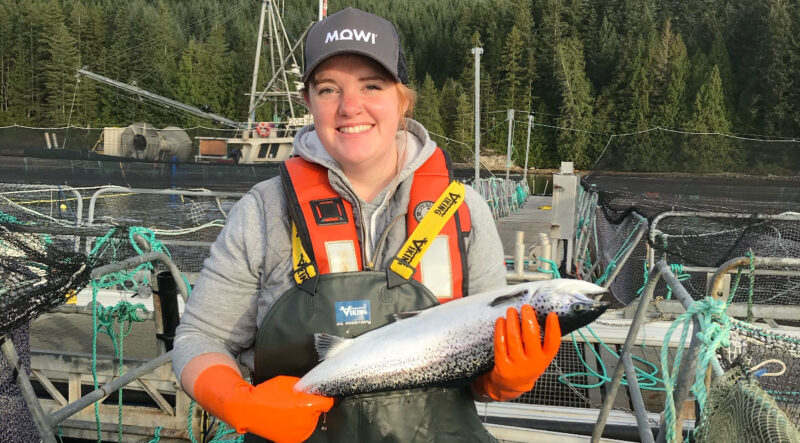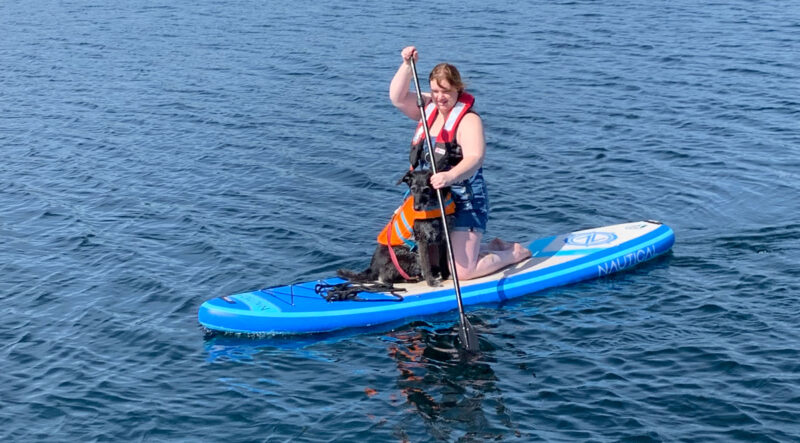THIS IS SALMON FARMING with DR. TERRA MACDONALD
“I will strive to promote animal health and welfare, relieve animal suffering, protect the health of the public and environment.”
Aquaculture is responsible for thousands of high-paid, skilled, and rewarding jobs across British Columbia. As the demand for sustainable and affordable farmed salmon grows worldwide, there is a fit for virtually any career path in this industry. In the first of our Q&A series with young professionals in BC’s salmon farming sector, Dr. Terra MacDonald a veterinarian and fish health manager at Mowi Canada West, talks about learning from the past to build her future, while raising a young family in Campbell River.
Tell us a little bit about yourself.
I live in Campbell River, where I have been since 2018. I am originally from Nova Scotia where I was born and raised, and I attended veterinary school in Prince Edward Island. My family is all still back on the East coast, but Vancouver Island is my home now! My hobbies include paddle boarding and walking on the beach, always on the look out for some whales. Thanks to my husband I’ve been introduced to sailing which has taken my whale watching endeavors to a whole new level! Basically, I just love being near and, on the water, and will take any chance to do so.
As a young salmon farmer in British Columbia, what are the most significant challenges you face in your daily operations and how do you tackle them?
The biggest challenge since starting my career in British Columbia has been the uncertainty for the future. As I start a life and a family here, it’s difficult to face that I may not be sure where I’ll be in 5 years.
Probably the second biggest challenge has been that I sometimes get a negative reaction when I tell people what I do for a living – it ranges from someone who is skeptical because they’ve “heard bad things” but aren’t really familiar with it, to sometimes downright mean … It’s only happened once but a stranger did call me a “monster” when I told them I was a salmon farmer. Yikes.
Tell us about at least two, of the many, opportunities available for young salmon farmers in British Columbia?
That would be a long list! There is so much potential for growth and innovation – having seen how far the industry has come since the 1990s, it’s really exciting to think where it might be in another 30 if we can continue to innovate and grow as an industry.
Also, for any young salmon farmer it’s a huge opportunity to learn from the “originals” – I’m so fortunate to have mentors and colleagues who have been in the industry since the beginning and have really “seen it all”. They have a wealth of knowledge to share and I’m so grateful to work with them.

Could you share a couple of insights into the sustainable practices you employ in your farming operations and how they contribute to the preservation of the environment?
As a veterinarian I think my main insights are into the health practices that go into ensuring that the fish are happy, healthy, and sustainable. One of the huge things that is important to me is ensuring that antibiotics are only used when necessary and appropriate, and I think a common misconception is that salmon receive a lot of antibiotics to “keep them healthy” when the truth is, they do not receive much at all, and typically only very early in their life cycle. Thanks to innovations in fish husbandry, vaccination, and production practices, bacterial disease is relatively uncommon and rarely causes an issue that needs to be addressed with antibiotics.
Another consideration that is very important is fish welfare, because as above, when we keep the fish at a high level of welfare it is much easier to keep them happy. This means being mindful of handling practices, density, fish health screening, and the day-to-day activities on the farm. The fish health staff and the farmers work closely together to ensure that the salmon are monitored, cared for, and interventions or changes are made where needed.
In your experience, what are some misconceptions or misunderstandings people may have about salmon farming, and how do you educate the public when given the opportunity?
As above, my biggest frustration as a veterinarian is that there is this wide misconception that farmed salmon are unhealthy – both as the fish themselves, and as a protein for human consumption. My entire career is dedicated to ensuring that the salmon are healthy throughout their life cycle, and I also have a responsibility to human health in ensuring that the end-product is suitable for food. Despite the intense amount of scrutiny the industry is under looking for fish health concerns, none have been identified, and yet there is still this leading headline of the fish being disease- and parasite-ridden, and toxic to eat. It’s extremely frustrating because I feel that it implies, at best, that I am a very poor veterinarian. At worst, it implies that I would willingly work in an industry that does not care about the health of its stock – which I certainly would not.
When I speak to the public about these issues, I try to remain open and factual, while also allowing my passion for my work to come through. The facts are readily available, and those who insist on these claims are often choosing to be ignorant to them, so simply stating them won’t make much of a difference.
What I hope to do is put a human face to the figures – they aren’t just coming out of a spreadsheet, there is a real person with real passion behind these facts and to deny them is to claim that I am at best, incompetent, and at worst, a liar.
I took an oath when I received my Doctor of Veterinary Medicine, and that oath means everything to me. The oath very clearly states that “I will strive to promote animal health and welfare, relieve animal suffering, protect the health of the public and environment”.
How do you balance the economic aspects of salmon farming with the need for environmental stewardship and conservation?
I balance the two by ensuring that we are always being transparent and striving towards better. Whether it is with new innovations to minimize farmed-wild interaction, the growth of integrated multi-trophic aquaculture, reducing the need for fish products in feeds, and/or partnerships with First Nations and community programs to further conservation efforts. There is a balance and salmon farming can play a role in all those needs, all while providing food security and reducing pressure on wild fisheries!
Over the years, the salmon farming industry has seen incomparable technological advancements and innovations. How have these advancements influenced your work, and which specific technologies do you find most beneficial in improving your farming practices?
One of the main innovations that I’ve seen since I joined the industry in BC is the variety of sea lice prevention and delousing technology that is available. We have gone from one main in-feed treatment, to several medicinal and non-medicinal options including hydrogen peroxide, freshwater, and mechanical delousing technologies, in addition to preventative options like skirts becoming more common. There is constant evolution in how these technologies are used and combined to make sea lice management one of the biggest advancements I’ve seen and use in my everyday work.
And last but certainly not least, name your favourite neighbourhood sushi restaurant.
Since being in Campbell River I’ve been treated to so many amazing sushi restaurants it’s hard to pick just one. My favourite place for sit down sushi is at Wasabiya, and my favourite place to grab a quick take-out lunch is from Sushi Mong. You can never go wrong with a classic salmon maki.

